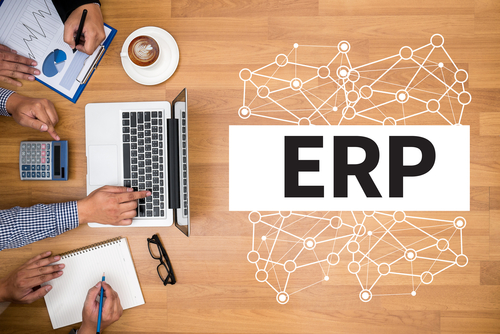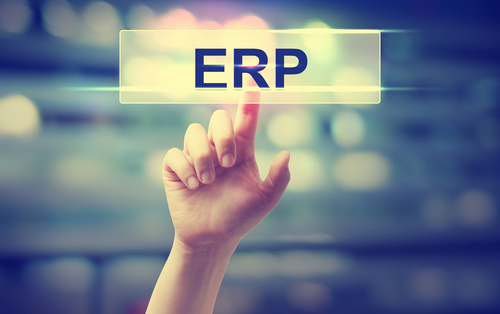Cloud-based ERP vs. On-Premise ERP for Small Manufacturing Business
When a small manufacturer faces the decision to purchase an ERP, the decision inevitably comes down to one of two options: on-premise vs cloud-based ERP.

You can also listen to this article:
While the type of production undertaken by a manufacturing company is important in deciding the kind of software needed, the size and scale of the operation is also a major factor as well. While larger manufacturers often have the benefits of scale including a stable cash-flow and access to short-term and long-term capital, small manufacturing are often bootstrapped, funded by VC seed funding or at best limited in terms of access to traditional streams of capital for investment and expansion.
This is true for equipment, infrastructure and other physical assets, but it is also true when a small manufacturer faces the decision to purchase an Enterprise Resource Planning or ERP software. When this happens, the decision inevitably comes down to one of two options: on-premise vs cloud-based ERP implementation. The decision is never easy, and each company must weigh the advantages and disadvantages of each to find the best path forward.
Advantages and Disadvantages of On-Premise ERP
On-premise servers for ERP are physical systems that are maintained within the company’s location. They must be maintained internally to optimize performance and operation.
Advantages of an on-premise ERP deployment include:
- Security – If a company owns extensive intellectual property, proprietary information or high liability concerns over the production of its products, an on-premise ERP can offer strong security. This keeps third parties from having any access to such data and can protect it from potential loss. The security in place must be robust, however, it always remains in control of the company.
- Reliability – On-premise ERP systems do not rely on internet connections. As a result, the loss of an internet connection either short or long-term means the company can remain in business and continue to produce. This may be an important consideration for process manufacturers such as those producing perishable goods such as food or medicines.
- Naturally Aligned Skillsets – If the manufacturer produces highly technical products that require a high level of skillsets in-house then an on-premise ERP may make sense as those skillsets may already exist among staff already on board. This alignment will depend on the type of product manufactured but having specific engineering skills in-house at the outset reduces the required investment and training compared to a “cold start”.
Disadvantages of an on-premise ERP deployment include:
- Cost – On-premise servers are a costly undertaking. To put this cost in focus, on-premise ERP systems are usually classified as a capital expense while cloud-based are classified as an operating expense. The up-front costs include the purchase of the system itself, the physical assets including server, racks and interfaces, as well as the training and support costs.
- Skillsets – For small manufacturers who do not produce highly technical products or who have limited resources for hiring, the skills required to set up an on-premise system may be limited or non-existent. It may also be outside the manufacturer’s salary budget to hire those with the skills to set it up.
- Scalability – As a small manufacturer scales, an on-premise ERP must scale with it. This means additional server space for additional data storage, racks, upgraded and updated versions, training and a host of other costs related to scalability.
Advantages and Disadvantages of Cloud-Based ERP
Cloud-based ERP systems consist of a virtual server hosted by a third-party cloud computing service provider. They are developed and maintained by the provider and updates and system changes are continuously deployed as they are rolled out making the latest version always accessible to manufacturers who use them.
Advantages of cloud-based ERP deployment include:
- Lower Start-up Costs – Cloud-based ERP systems usually consist of a contracted or monthly fee or subscription service. Because the system runs web-based, there is no investment in physical assets required by the manufacturer. Maintenance costs and other system costs are provided by the third-party software provider under the covers and included as part of the subscription or monthly cost. Cloud-based ERP providers also deploy improvements, patches and service enhancements seamlessly and on an ongoing basis, reducing the time and cost required for a small manufacturer to take advantage of these improvements.
- Scalability – Small manufacturers may not always need a full-service ERP system. There may be specific features required as well as many that are not depending on the final product, mode of production, company size and other factors. Cloud-based ERP systems are flexible in terms of scalability as it is often possible to purchase a la’ carte to tailor the system to the needs of the manufacturer. This saves cost and reduces training as well as shortening the adoption time and learning curve. It also means that as a company grows, increases in access to the system can be purchased as needed in the form of additional “seats” while new features that may be required that were not in the past can be added incrementally.
- Flexibility – Cloud-based ERP systems are flexible in that backup is automated. It provides an inherent “disaster” plan for restart in the case of natural disasters because production data and the production system is still accessible. By comparison, on-premise systems must still send their data to a reserve site or manually back it up to realize the same benefit.
Disadvantages of a cloud-based ERP deployment include:
- Security – With a cloud-based ERP, a small manufacturer’s data is always in the hands of a third party. As a result, it must rely on the third party’s security to safeguard its data. This is a concern for many manufacturers depending on the type of product manufactured or the level of IP and proprietary data involved. However, most third-party providers have demonstrated security on par with that of the small manufacturer’s security measures themselves and in some case may exceed that of the company.
- Reliability – Cloud-based ERP systems require an internet connection. In locations where services is not reliable, or in the case of certain disruptions of service due to natural disasters, an interruption in internet service could mean the difference between operating the factory or not during the disruption.
Making the Right Choice
You might also like an infographic about Top 7 Mistakes When Searching ERP Software.
While the size of an enterprise will make a difference in the selection of an on-premise vs cloud-based ERP, each company must make the determination based on their unique requirements. Cost of and access to capital, growth curve, access to technical skillsets, security and reliability are all important in the determination of which type of system to use. But for small manufacturers, flexibility, speed of access, reduced training and a nimble and agile “pay as you go” service such as cloud-based ERP may mean more capital is available for operation of the business.



